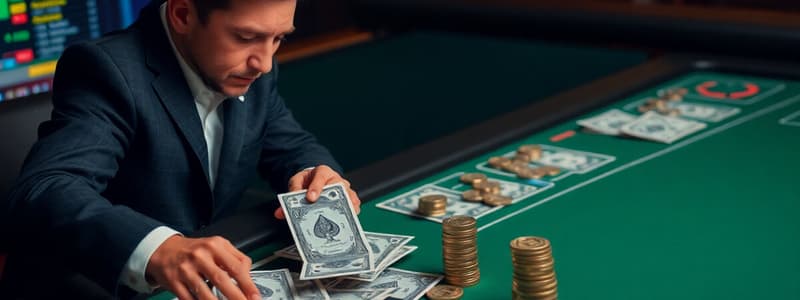Podcast
Questions and Answers
In American roulette, what is the probability of landing on black or red?
In American roulette, what is the probability of landing on black or red?
- 52.6%
- 47.4% (correct)
- 48.6%
- 50.0%
What is the main misconception associated with the Gambler’s fallacy in gambling?
What is the main misconception associated with the Gambler’s fallacy in gambling?
- Winning is more likely after a losing streak. (correct)
- Losing streaks can influence the odds of future outcomes.
- The probabilities change based on previous outcomes.
- All outcomes have equal likelihood regardless of history.
Why might trading differ significantly from gambling in a casino setting?
Why might trading differ significantly from gambling in a casino setting?
- Traders have more control over their outcomes than gamblers.
- Trading involves more random outcomes than games of chance.
- In trading, probabilities are more uniform than in gambling.
- Market probabilities are not fixed like in casino games. (correct)
What is the primary flaw in the student's proposed dynamic risk management strategy?
What is the primary flaw in the student's proposed dynamic risk management strategy?
What factor contributes to the casino's edge in games like roulette?
What factor contributes to the casino's edge in games like roulette?
What alternative does the instructor mention to the student's proposed strategy?
What alternative does the instructor mention to the student's proposed strategy?
What misconception does the instructor highlight regarding the correlation of trade outcomes?
What misconception does the instructor highlight regarding the correlation of trade outcomes?
What approach does the instructor suggest for managing risk during losing periods?
What approach does the instructor suggest for managing risk during losing periods?
What lesson can be inferred from the author's roulette experience?
What lesson can be inferred from the author's roulette experience?
What trap does the instructor warn new traders about regarding risk management?
What trap does the instructor warn new traders about regarding risk management?
Flashcards are hidden until you start studying
Study Notes
Dynamic Risk Management is a Misguided Approach
- A student in the Pine Script Mastery Course suggested a dynamic risk management strategy that increases risk after a losing streak and decreases risk after a winning streak
- The student believed this would improve net profit for a strategy with a 50% win rate
- This approach is a dangerous misinterpretation of probability theory, known as the gambler's fallacy
- The gambler's fallacy states that after a streak of wins or losses, the probability of the next trade being a win or loss is higher than the historical average
- Each trade's outcome has no real correlation to the previous trade's outcome
Drawdown-Based Risk Management is an Alternative Approach
- The Turtle Traders, a group of successful traders, employed a drawdown-based risk management strategy
- This method reduces risk based on the extent of the current drawdown
- This approach does not rely on predicting the probability of the next trade winning or losing, which is impossible
Roulette and the Gambler's Fallacy
- The author discusses his personal experience playing roulette where he won a large sum of money through pure luck
- While casino games like roulette aren't directly related to trading, they demonstrate the gambler's fallacy in action
- The chance of landing on black or red in American roulette is not 50/50 because of the green zero
- European roulette has a slightly higher chance of landing on black or red due to having only one green zero
- The author's unexpected wins were due to luck and not skillful prediction
Creative Risk Management Techniques
- Despite the gambler's fallacy, there are creative position sizing techniques and models that can improve a trading system's edge and risk-adjusted returns
Studying That Suits You
Use AI to generate personalized quizzes and flashcards to suit your learning preferences.




